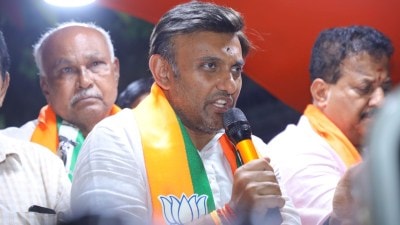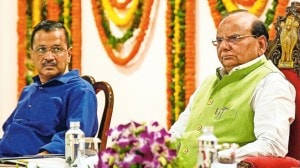- India
- International
Punjab uses cell phone data to fence people in quarantine, track contacts
Punjab uses cellphone data to fence people in quarantine, track contacts their customers in Punjab download the application. But the government hasn’t enforced the order for the majority of citizens as downloading the App it is still voluntary for them.
 The COVA mobile application has been downloaded by more than 6.5 lakh mobile phones till date. (Representational Photo)
The COVA mobile application has been downloaded by more than 6.5 lakh mobile phones till date. (Representational Photo)
WHEN SOME people quarantined in Patiala’s Shutrana village and Mohali’s Jagatpura village breached the “geo-fence” meant to keep them indoors, an alert was sounded at Punjab’s COVA control room and officials soon landed at their places to ensure enforcement. With the state witnessing a spurt in coronavirus cases and having more than 6,900 under quarantine, it has become first state in the country to use a trove of cellphone data like Call Detail Records and GPS to enforce the lockdown, ensure home delivery of groceries and to trace the contacts of COVID patients. Many states are now following its model.
Surveillance, containment
The COVA mobile application has been downloaded by more than 6.5 lakh mobile phones till date and has multiple features — it also has a chat-bot – ‘COVID-19 Chat’ for coronavirus self-assessment, an option to connect to a doctor, place order for grocery and essentials, search foreign travellers, report mass gathering, look for the helpline numbers and read government orders. Most importantly it has a feature to find the COVID-19 patient nearest to you.
The state government in an order passed on April 2 under the Epidemic Diseases Act and National Disaster Management Act had made it mandatory for Google and Apple to ensure that their customers in Punjab download the application.
Punjab uses cellphone data to fence people in quarantine, track contacts their customers in Punjab download the application. But the government hasn’t enforced the order for the majority of citizens as downloading the App it is still voluntary for them.
However, it is mandatory for people in quarantine at hospitals and home to download the App.

This has led to creation of mini ‘geo-fences’ across neighbourhoods in Punjab, and officials can see at least 14-day location history of the app users for tracking purposes. But the mobile application, which predominantly uses GPS location of the phone, is not the only tool available at the state’s digital armoury against corona crisis. The CDR (call detail records) of coronavirus patients is being used for contract tracing.
When Punjab last month witnessed its first COVID-19 casualty, it was found the 70-year-old had visited a religious gathering soon before he died. The authorities went into his call data records to trace his steps with aide of the tower location. Using services of a Gurgaon-based IT firm DronaMaps providing 3D mapping technology, a spread analysis of the person revealed the virus had spread to 23 persons, majority of whom were in SBS Nagar. The maps are also being used to keep an eye on those quarantined.
“Both GPS-based tracking and contact tracing is done using the data available with us through the application. As per Government of India guidelines, we are also using call detail records of positive persons to do a mapping. It is done to trace the persons with whom the affected person may have come in contact for the past 14 days. The MHA has authorised us to use anyone’s call data records,” senior IAS officer Ravi Bhagat, who is incharge of the COVA app, told The Indian Express.
Help for users
A COVA user has access to location and phone numbers of authorized shop owners located nearby. There is an option to connect to a doctor – when one calls on the number, the IVR system asks few questions of medical history to the person, who then gets a call back from the relevant doctor. There are 2,200 doctors, mostly volunteers, available on the app. The contact details and location of milk sellers and chemists is also available
Threat to your privacy?
Such vast trove of data available with a State always sets alarm bells ringing but the crisis caused by coronavirus has led many countries and states in India on the same path. Abhinav Sood, an advocate practicing at Punjab and Haryana High Court, asked whether the data will be deleted after the crisis is over and sounded a caution, saying, “Big data means big responsibility and the government has to ensure that there is restricted access to the data”.
Bhagat said the application has a privacy policy and a user can use the application only after consenting to the terms therein. “The data is secure on government servers and we are not sharing our data with anybody. If we are sharing with anybody, we are making them sign a non-disclosure agreement which is very strict. The data is for self-consumption and the data, which is in public domain, is only to keep the user aware of the nearby person who is positive. We are not disclosing names. We are only informing them about proximity,” he said.
The Indian Express found privacy policy of Punjab’s COVA app has been taken from the policy attached to Government of India’s e-governance app UMANG. However, many of the essential clauses like allowing a user to delete his account and the assurance to remove all the personal information from the system on such deletion, so that it is not accessible from any ‘regular operation’ but is retained in an encrypted form for legal purposes, have not been incorporated in COVA app policy. UMANG or Unified Mobile Application for New-age Governance is an aggregator app offering different services being provided by the central and state governments. However, some essential changes in the copied policy are glaring – the user data of UMANG is stored in an encrypted form but the policy for COVA uses a non-technical term “secured environment” in its place.
Bhagat explained that the COVA application was developed by experts, who had previously worked on the UMANG app and it was best to be available under existing circumstances in absence of a definite law regarding privacy in the country. “I know privacy is an issue, but if we are able to empower the citizens with right information against coronavirus, I am sure it will be useful for everyone. We have to look at it more emotionally than legally because of what we are dealing with,” he said, adding since the UMANG policy is government approved, they considered it to be more appropriate.
When the lockdown ends and people move out frequently, the authorities want people to remain updated through the application about positive and quarantine cases.
Model for other states
Bhagat said 13 states including Haryana, Chandigarh, Chattisgarh, Rajasthan and Manipur have taken the ‘app code’ from them to explore creation of a similar system in their databases.
The main access to the COVA data is available with Deputy Commissioners, Senior Superintendent of Police and Chief Medical Officers. There are 20 people who are working 24×7 at the COVA control room and some of them are also working from home. “We start at 7 am and find time to rest somewhere around 12 in the night. We are only empowering citizens as per the existing requirements,” said Bhagat.
So far, as part of its unique surveillance model to deal with the pandemic, ther state has recorded 73 geo-fence violations till Thursday afternoon.
Apr 27: Latest News
- 01
- 02
- 03
- 04
- 05








































